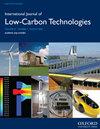A case study on the design and development of solar food cooking system with a PCM as a heat storage unit
IF 2.3
4区 工程技术
Q3 ENERGY & FUELS
引用次数: 3
Abstract
This study presents the design and fabrication of an urban solar food cooking system with a phase change material (PCM) as a heat storage tank. The effort has been taken to test the system experimentally and explore its thermal performance under actual climatic conditions of Mumbai, India. The solar heat energy is stored in the tank using commercial grade Erythritol as PCM in current research work. A heat exchanger is well designed and fabricated to regulate the flow of solar heat energy from the storage tank to the cooking vessel, similar to the domestic Liquefied Petroleum Gas (LPG) cooking system. This solar cooker is designed to cook food twice a day for four family members (Equivalent to the energy of 5000 KJ). Cooking experiments were conducted on 19th April 2019 for the afternoon and evening slots with rice and potato as cooking loads, respectively. The time taken for cooking rice and potato are from 12:30 pm to 12:52 pm (22 minute) and from 05:30 pm to 05:59 pm (29 minutes), respectively. The heat transfer rate was also observed at different storage tanks and cooking unit points. The experiments show cooking is possible twice a day and considered as convenient as domestic LPG stoves. Furthermore, it was found that comparatively less time was required for cooking food than the other existing solar cookers.PCM作为储热单元的太阳能食品烹饪系统的设计与开发案例研究
本研究介绍了一种以相变材料(PCM)为储热罐的城市太阳能食品烹饪系统的设计和制造。已经对该系统进行了实验测试,并在印度孟买的实际气候条件下探索其热性能。在目前的研究工作中,太阳能是用商业级赤藓醇作为PCM储存在储罐中的。热交换器经过精心设计和制造,可调节太阳能从储罐到烹饪容器的流量,类似于国内液化石油气(LPG)烹饪系统。这种太阳能炊具设计用于为四个家庭成员每天烹饪两次食物(相当于5000 KJ的能量)。2019年4月19日,分别以大米和土豆为烹饪负荷,对下午和晚上的时段进行了烹饪实验。烹饪米饭和土豆的时间分别为下午12:30至12:52(22分钟)和下午05:30至05:59(29分钟)。还观察了不同储罐和烹饪单位点的传热速率。实验表明,每天烹饪两次是可能的,并且被认为与家用液化石油气炉灶一样方便。此外,研究发现,与其他现有的太阳能炊具相比,烹饪食物所需的时间相对较少。
本文章由计算机程序翻译,如有差异,请以英文原文为准。
求助全文
约1分钟内获得全文
求助全文
来源期刊

International Journal of Low-carbon Technologies
Engineering-Architecture
CiteScore
4.30
自引率
4.30%
发文量
106
审稿时长
27 weeks
期刊介绍:
The International Journal of Low-Carbon Technologies is a quarterly publication concerned with the challenge of climate change and its effects on the built environment and sustainability. The Journal publishes original, quality research papers on issues of climate change, sustainable development and the built environment related to architecture, building services engineering, civil engineering, building engineering, urban design and other disciplines. It features in-depth articles, technical notes, review papers, book reviews and special issues devoted to international conferences. The journal encourages submissions related to interdisciplinary research in the built environment. The journal is available in paper and electronic formats. All articles are peer-reviewed by leading experts in the field.
 求助内容:
求助内容: 应助结果提醒方式:
应助结果提醒方式:


